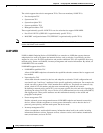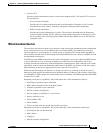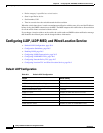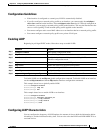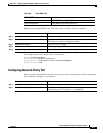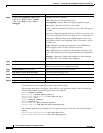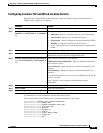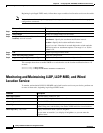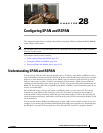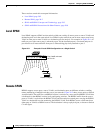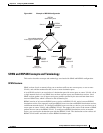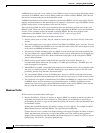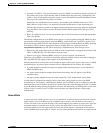
26-10
Catalyst 3560 Switch Software Configuration Guide
OL-8553-06
Chapter 26 Configuring LLDP, LLDP-MED, and Wired Location Service
Monitoring and Maintaining LLDP, LLDP-MED, and Wired Location Service
Beginning in privileged EXEC mode, follow these steps to enable wired location service on the switch.
Note Your switch must be running the cryptographic (encrypted) software image to enable the nmsp global
configuration commands.
This example shows how to enable NMSP on a switch and to set the location notification time to 10
seconds:
Switch(config)# nmsp enable
Switch(config)# nmsp notification interval location 10
Monitoring and Maintaining LLDP, LLDP-MED, and Wired
Location Service
To monitor and maintain LLDP, LLDP-MED, and wired location service on your device, perform one
or more of these tasks, beginning in privileged EXEC mode.
Command Purpose
Step 1
configure terminal Enter global configuration mode.
Step 2
nmsp enable Enable the NMSP features on the switch.
Step 3
nmsp notification interval {attachment |
location} interval-seconds
Specify the NMSP notification interval.
attachment—Specify the attachment notification interval.
location—Specify the location notification interval.
interval-seconds—Duration in seconds before the switch sends the
MSE the location or attachment updates. The range is 1 to 30; the
default is 30.
Step 4
end Return to privileged EXEC mode.
Step 5
show network-policy profile Verify the configuration.
Step 6
copy running-config startup-config (Optional) Save your entries in the configuration file.
Command Description
clear lldp counters Reset the traffic counters to zero.
clear lldp table Delete the LLDP neighbor information table.
clear nmsp statistics Clear the NMSP statistic counters.
show lldp Display global information, such as frequency of transmissions, the holdtime for
packets being sent, and the delay time before LLDP initializes on an interface.
show lldp entry entry-name Display information about a specific neighbor.
You can enter an asterisk (*) to display all neighbors, or you can enter the
neighbor name.



